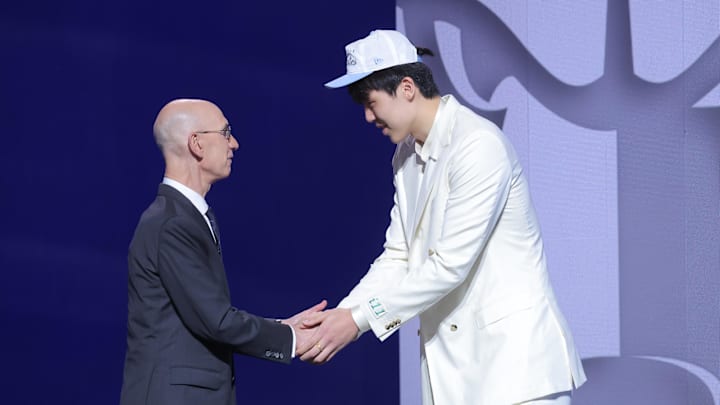If the Portland Trail Blazers' unconventional selection of Yang Hansen with the No. 16 overall pick doesn't pan out, Kasparas Jakucionis is the one they will come to regret passing on.
Jakucionis had arguably the most significant fall in the draft, going from being firmly in the mix for a top ten selection only to wind up landing with the Miami Heat at No. 20. Earlier on in the season, Yahoo Sports' Kevin O'Connor even mentioned Jakucionis as the propsect who could challenge Dylan Harper for the No. 2 selection.
Kasparas Jakucionis was a steal for the Miami Heat
Jakucionis is a well-rounded player, averaging 15.0 points, 5.7 rebounds, and 4.7 assists at Illinois on 42/32/85 shooting splits. The few concerns surrounding his game pertained to his athleticism, defense, and decision-making, with 3.7 turnovers per game.
Jakucionis had a quiet first Summer League game, recording three points while shooting 1-of-7 from the field and 0-of-4 from beyond the arc. After the game, teammate Pelle Larsson praised Jakucionis' decision-making and defense:
"He's a really smart player and makes the smart play every time. I was really impressed with how he moves his feet on defense. I haven't seen him play defense; all the highlights they show when you get drafted are offensive. I was impressed with him."
His lackluster Summer League debut already showed that these concerns were widely overblown, and Jakucionis should've been a lottery pick.
The opportunity cost of Portland taking Yang Hansen
He was our top realistic prospect for the Blazers to take at No. 11. Their decision to trade back with the Memphis Grizzlies while picking up additional draft capital made perfect sense, given there wasn't a significant tier dropoff falling back five spots.
However, when they initially made the deal, the value seemed worth it because one of the top prospects for Portland at 11 would likely fall to 16, whether it was Noa Essengue, Carter Bryant, Derik Queen, or Jakucionis.
The Blazers had their own plans, trying to trade back as far as possible while still feeling comfortable that Hansen would still be on the board.
There's a lot of risk attached to Hansen -- not just in the prospect himself, but also in the opportunity cost of what the Blazers passed on to secure him. They could've taken the same trade the New Orleans Pelicans offered the Atlanta Hawks to land Queen at No. 13, giving up the No. 23 overall pick and an unprotected 2026 first-round pick. From that standpoint, they're essentially investing two valuable first-round picks into Hansen.
But even if the Blazers just took the Grizzlies trade and stayed at 16, taking Jakucionis would have presented a high-floor option for a team that can't afford to miss on these picks. His combo guard frame and skill set would have provided the Blazers with valuable backcourt insurance.
Portland easily could have flipped Holiday elsewhere, replacing him with Jakucionis, who fits their timeline much better. It would also make them more comfortable to give Scoot Henderson and Shaedon Sharpe the keys to the backcourt, knowing that Jakucionis could fill the void should one come up short.
Perhaps Hansen's unique skillset as a big man with tremendous footwork and rare processing ability winds up being the steal of the draft, and the Blazers never think twice about who else they could've gotten (or traded for).
But Hansen does have a concerningly low ceiling coming over from the CBA; if he doesn't pan out as expected, the Blazers will have to wonder how they left an NBA-ready guard in Jakucionis slip through their fingers.
